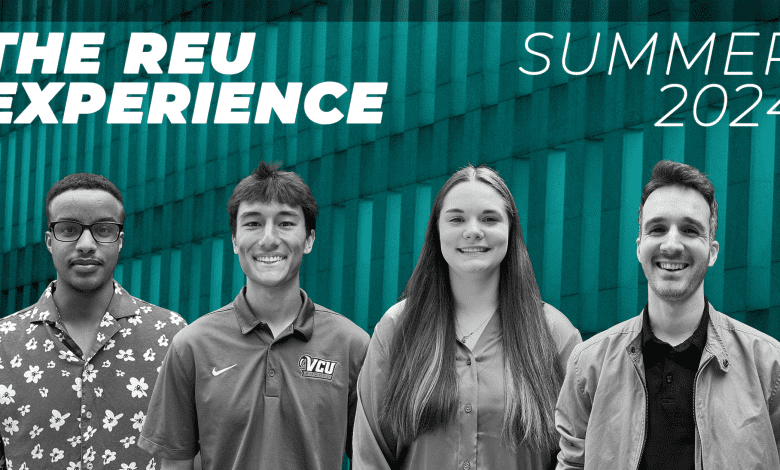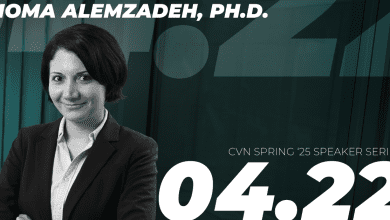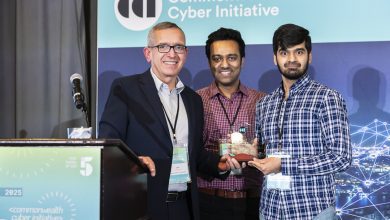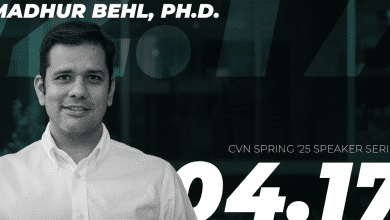
This summer, the Commonwealth Cyber Initiative Central Virginia Node (CCI CVN), provided a transformative opportunity for undergraduate students by funding three specialized Research Experiences for Undergraduates (REU) programs. These programs, hosted at Virginia Commonwealth University (VCU), allowed students to tackle complex challenges across diverse fields, from soil moisture sensing to quantum computing.
Developing Innovative Soil Moisture Sensors
One of the REU projects focused on creating a low-cost, reliable soil moisture sensing solution. Existing soil moisture sensors are either prohibitively expensive or unreliable, particularly in agricultural and environmental applications. Under the guidance of Eyuphan Bulut, Ph.D., associate professor of computer science at VCU, REU participant Micah Kinney aimed to leverage the unique propagation characteristics of WiFi signals under soil, which vary depending on moisture levels. Using machine learning models to analyze channel state information (CSI) from WiFi signals showed highly accurate moisture prediction results in certain soil texture compared to commercially available sensors. As Micah continues working on more data collection throughout the Fall semester, the aim is to use it to improve the accuracy of these prediction models.
Kinney is a sophomore majoring in Computer Engineering and worked directly with Dr. Bulut for this research project. “The ability to work on something that has the potential to greatly affect the real world,” he said, greatly attracted him to the opportunity.
Kinney found his passion for research through this program. “The best part of this experience was realizing how much I enjoy the research process itself,” he said. “Taking the time to experiment, find solutions, and think creatively about new approaches has been incredibly rewarding.”
Securing Brain Stimulation Devices from Cyber Threats
Another REU program, led by Ravi Hadimani, Ph.D., focused on the vulnerabilities of neuromodulation devices, such as deep brain stimulation (DBS) systems. These critical medical devices treat neurological disorders and can be susceptible to malicious cyber interference if connected to wireless networks. Students worked on developing safety measures to protect these devices from intentional electromagnetic interference (IEMI).
This summer, students continued to build on promising results obtained from testing human and animal brain phantoms using DBS, transcranial magnetic stimulation (TMS), and simultaneous TMS and DBS. The research also included developing anatomically accurate rat phantoms for neuromodulation safety testing.
Akshita Ramesh, a junior studying computer engineering, was captivated by the interdisciplinary nature of the research. “It’s been an amazing experience working at the intersection of biomagnetics and computer science,” Ramesh said. “I never expected to dive so deeply into these topics as a computer engineer.”
Freshman Kai Feng, a mechanical engineering major, echoed this enthusiasm. “Working on real research that could potentially be published is an exciting challenge,” highlighting the impact of hands-on research early in his academic career.
Exploring Quantum Computing Solutions
The third REU program, led by Jayasimha Atulasimha, Ph.D. and co-mentored by his Ph.D. students Aniruddha Chakraborty and Md Fahim Chowdhury, addressed the computational complexity of large-scale optimization problems, which are critical for cybersecurity and autonomous systems. Students explored both classical and quantum computing approaches, specifically applying Quantum Annealing on D-Wave computers and the Quantum Approximate Optimization Algorithm (QAOA) on IBM’s quantum simulators, exploring the potential of quantum algorithms to handle complex optimization tasks more efficiently than classical methods.
For Kennedy Martin, a senior computer science major at VCU, the collaborative nature of this research was the highlight of her experience. “What I loved most was working with a diverse team from different academic backgrounds,” Martin said. “We each brought something unique to the table, and that collective strength helped us overcome challenges.”
Hussein Elshowaya, a junior studying electrical engineering, was fascinated by the complexity of quantum computing. “I was thrilled to dive into the math and theory behind quantum systems,” he said. “Even when progress slowed, it was rewarding to experiment with new ideas.”
Senior computer engineering major Hugo Davalos also enjoyed gaining practical experience with quantum computing, noting, “It’s exciting to finally work hands-on with something I’ve been interested in for so long.”
An Impact on Students’ Futures
The hard work of the students over the summer culminated in the poster symposium at VCU. During this event they presented their research and learned to communicate their findings with other researchers and non-engineers, honing valuable communication skills that will serve them in the future.
CCI CVN’s continued commitment to nurturing young talent in engineering and computer science is evident in the impact these programs have had. As Micah Kinney emphasized, “This experience has given me a clearer understanding of what I love about research and how I can contribute to the future of engineering.”
Through this innovative REU experience, CCI CVN continues to advance knowledge in critical fields, preparing students to lead and innovate in a rapidly evolving world.
If you’re a student in Central Virginia and you’re interested in participating in one of our sponsored REU programs next semester, keep an eye on our student opportunities page for updates.



